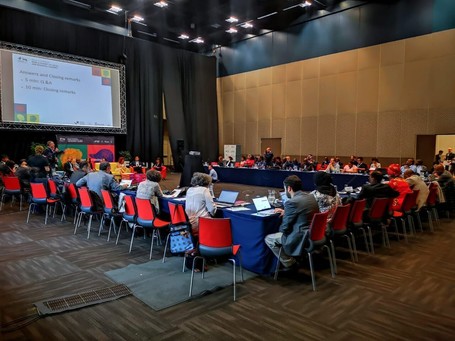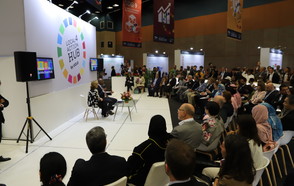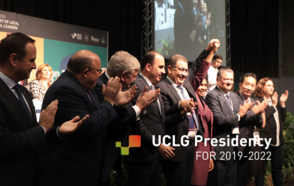
On November 12, 2019, in the framework of the UCLG World Congress, members and partners of UCLG came together during the IV Learning Forum to evaluate the state of learning within the network, assess innovative learning methodologies and mechanisms, inspire key elements of the learning strategy for 2019-2021, and co-create concrete recommendations to boost the reach of UCLG policies through learning.
As Secretary General Emilia Saiz emphasized during her remarks, “learning is one of the most important tools as a global network to advance our policies and advocacy processes. We are in a time when coordination is not enough. It is about synchronizing.” The full-day Learning Forum was divided in two main thematic areas, with interactive and participatory sessions allowing the engagement and inputs of many different partners in the spirit of seek, sense, share previously identified as an important component of network learning.
The morning sessions were focused on the localization of Global Agendas, particularly the work done so far in localizing the SDGs, and the increasing demand for a similar learning approach towards the Sendai Framework for Disaster Risk Reduction and the resiliency agenda. The sessions demonstrated the diversity of practices and experiences in the network, and the wide impact that the Training of Trainers approach and the Learning Modules developed by UCLG together with the Global Taskforce, UNDP-Art and UN-Habitat has had in the network. It also allowed us to identify opportunities to foster further integration, increase accessibility and reach, promote follow-up processes in which national and regional associations can play a vital role, and the potential of further cooperation with academia for monitoring, innovation and research. The need for further learning in areas such as local finances, migration, and housing was identified, while recent initiatives from different members in the network to increase the reach of our learning through new technologies was also highlighted.
The afternoon session focused on an assessment of the state of peer-learning, decentralized cooperation and knowledge management in our network. The effectiveness of peer-learning in engaging cities across the globe, building technical capacity, and fostering trust between members and within the organization was clear from the discussions. At the same time, the importance of process, context and culture when adapting and transferring policies and practices was emphasized. The need for a technical and political alliance for peer to peer learning to be implemented was also noted, pointing at remaining challenges in maintenance, accountability and continuity, which require a broader leadership understanding at both technical and political levels. The final session of the day consisted of an open floor discussion, which revealed several ideas of the learning agenda moving forwards, particularly in regards to furthering the reach and synergy of learning efforts and best practice platforms in the network.
During the whole congress, members and partners ran learning session– enabling peer learning, gaming, and interactive networking. It was encouraging to see creative learning methodologies becoming streamlined in the UCLG network.
The Learning Forum underlined the importance of continuing to foster a learning culture throughout the organization, building on the expertise of the members and grounded on the principles of solidarity, mutual learning and knowledge sharing. Sara Hoeflich, director of UCLG Learning, closed the forum by thanking all participants, members and partners, and recognizing how the learning forum as an ongoing space for co-creation and collaboration has become a garden, rich in the diversity of its members with their own life cycle and processes, but befit of the right nutrients, light and incentives.
- Visit World Congress website for more info













